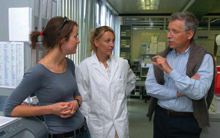on August 17, 2006
Janine Stubbs has joined the lab of Antonio Lanzavecchia.
Janine Stubbs graduated with a Bachelor of Science from the University of Tasmania and received a scholarship to the Australian National University where she completed her Honours degree on the molecular mechanisms of nervous system development of the wallaby, Macropus eugenii. Janine then under-took a studentship in the laboratory of Prof. Barry Dickson at the Institute for Molecular Pathology, Vienna, Austria,on the genetic mapping of genes involved in Drosophila nervous system development.
A studentship in the lab of Prof. Ivo Pavlik at the Institute of Vetinary Medicine, Brno, Czech Republic, on the isotyping of Mycobacterium avium stimulated her interest in infectious disease. Janine completed her PhD under the supervision of Prof.Alan Cowman at the Walter and Eliza Hall of Medical Research in Melbourne,Australia, on the molecular mechanisms of invasion of human erythrocytes by the malaria parasite, Plasmodium falciparum. Erythrocyte invasion involves the interaction between erythrocyte receptors and parasite ligands. Ligands on the parasite surface are likely targets of natural immunity and represent good candidates for formulation into a subunit vaccine. It has long been appreciated that P.falciparum exploits multiple ligand receptor interactions for erythrocyte invasion that are functionally redundant.
In her PhD, Janine demonstrated with the genetic knockout of the parasite invasion gene PfRh4 that expression of this parasite ligand is essential for invasion in the absence of sialic acid-dependent mechanisms of invasion. It was found that the transcriptional regulation of this gene determines the ability of P.falciparum to interact with sialic acid-independent receptors, suggesting that gene silencing of parasite invasion ligands may be important for immune evasion.
The identification of invasion ligands and methods by which malaria parasites escape immune detection are essential for the rational development of effective vaccines against malaria. Her work was published in Science and collaborative efforts to characterise the immune response to PfRh4 in individuals living in malaria endemic regions have been submitted for publication.
Prior to arriving in Bellinzona, Janine was involved in a Legionnaires’ disease case-control study with Dr Damon Eisen at the Royal Melbourne Hospital correlating functional levels of mannose-binding lectin in human serum with disease susceptibility (submitted).

Janine Stubbs, discusses with Nadia Bernasconi and Professor Lanzavecchia







